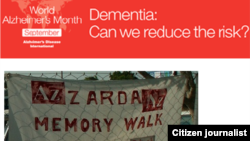The Zimbabwe Alzheimer’s and Related Disorders Association (ZARDA) says an estimated 18,000 local people are living with the brain disease, with thousands not receiving adequate care and support.
According to the World Health Organization, Alzheimer’s disease is the most common cause of dementia. It is a brain disease that slowly destroys memory and thinking skills.
Alzheimer's is estimated to contribute to nearly 70% of dementia cases. Generally people over the age of 60 are most affected.
Dementia has no cure and or treatment to alter its progression, eventually destroying a person’s ability to carry out simple daily tasks.
Jan Woods, chairperson of the Zimbabwe Alzheimer’s and Related Disorders Association, said some people were not aware of the disease due to lack the awareness of ZARDA in Zimbabwe, which is one of the only organizations dedicated to support and assistance for people with the disease
“One of the problems is also that so many people with dementia are undiagnosed, which I think is also a worldwide problem, and many of those people will be living in the rural areas and of course it’s a lack knowledge and understanding of what dementia actually is,” said Woods.
Dementia affects each person in a different way and signs and symptoms linked to dementia can be forgetfulness, being lost in familiar areas to the late stages where a person becomes completely unaware of time and places and is unable to identify relatives and friends.
ZARDA facilitates support for those who are diagnosed with dementia, providing assisted care and giving families training on living with a person diagnosed with dementia.
WHO says the lack of awareness and understanding of dementia in most countries, results in stigmatization, barriers to diagnosis and care; these barriers heavily impact caregivers, families and communities.
“We offer them practical support, how to cope, ideas on the best way to get people to engage, to keep them occupied, how to communicate with them and we do run support care meetings for primary caregivers,” said Woods.
ZARDA encourages families who believe their loved ones may have dementia to reach out for support through their organization and also visit doctors to receive proper diagnoses of the disease.









